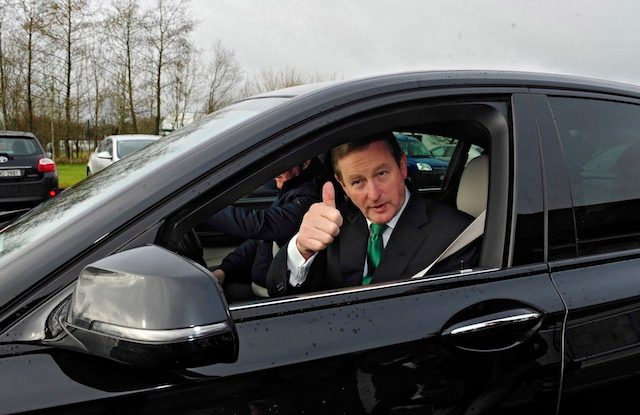SUMMARY
This is AI generated summarization, which may have errors. For context, always refer to the full article.

DUBLIN, Ireland (UPDATED) – Ireland awaited results Sunday, February 28, of an election that ousted the coalition government but left no clear winner, putting pressure on old rivals to reach a deal or risk a stalemate that could mean a second vote.
With 105 of 158 results in, voters had clearly punished Prime Minister Enda Kenny’s Fine Gael and junior partner Labour in a swing to anti-austerity groups and anti-establishment candidates that echoed recent elections in other eurozone countries like Spain and Greece.
“Democracy can be very exciting but it’s merciless when it kicks in,” Kenny told RTE television late Saturday, February 27, after he was re-elected in his rural constituency of Mayo.
“Clearly the government of Fine Gael and Labour are not going to be returned to office.”
Irish newspapers heralded the election as a “rebellion” and an “earthquake” that had transformed the political landscape.
Senior figures to lose their seats included the deputy leader of Fine Gael, James Reilly, and outgoing Labour minister Alex White, as the party was perceived to have betrayed its center-left supporters in coalition.
Some final results from tightly-fought constituencies will not emerge until at least Monday, February 29, and parties emphasized the need to await the full breakdown of seats in parliament before discussing potential deals between parties.
Talk turned quickly to a possible agreement between Fine Gael and its old rival Fianna Fail, which has bounced back from an electoral drubbing 5 years ago, as the best way to avoid a second election.
Options include unstable minority Fine Gael government supported by Fianna Fail, or a once-unthinkable alliance between the two parties, which have roots on opposing sides of Ireland’s civil war and have been rivals in parliament since 1932.
“In the past this would have been anathema to them,” said Gail McElroy, political science professor at Trinity College Dublin, noting that both parties had ruled out such a deal ahead of Friday’s election.
“You can’t immediately say you’ll go into government because it will look like you’re lying and you’ve broken promises. If you leave it a little while, three, four weeks, and there’s no government on the table, it might be a little easier.”
There would be strong opposition to any deal within the parties but they both occupy the center to center-right ground and would together have a healthy majority.
Commentator Brendan O’Connor wrote in the Irish Independent: “The best guess anyone can make today is that the establishment are going to have to hold their noses, circle the wagons and huddle together to create a government, to keep the barbarians from the gate.”
Sinn Fein surge
Kenny faced anger within his party over the result but resisted calls to resign, saying he had a “duty and responsibility” to see that Ireland has a stable government.
An alliance between Fianna Fail and Fine Gael would make Sinn Fein the main opposition party in Ireland, a coup for the party once seen as the political voice of the Irish Republican Army.
The left-wing party has capitalized on anger over austerity and was set to add as many as 10 seats to its previous count of 14 in the 158-seat Dail.
“We’re into a new era, we have seen in this election a seismic change,” Sinn Fein leader Gerry Adams said after he was re-elected in his County Louth constituency.
Negotiating parties have until March 10 to make a deal, when lawmakers are due to meet in the lower house of parliament Dail Eireann and in theory, appoint a prime minister.
Ireland exited a bailout program in 2013 and has become the fastest growing country in the eurozone in recent years, with predicted GDP growth of 4.5% in 2016.
But many of the country’s 4.6 million people complain they have not felt any improvement amid a housing crisis and the continued effects of years of spending cuts and tax hikes.
“They weren’t listening to the people, it’s as simple as that,” said Susan O’Brien, a horticulture worker in her early 40s. – Naomi O’Leary, AFP / Rappler.com
Add a comment
How does this make you feel?
There are no comments yet. Add your comment to start the conversation.